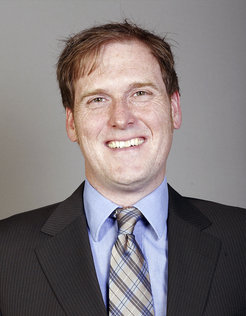Randolf Pohl receives Francis M. Pipkin Award from the American Physical Society
Dr. Randolf Pohl, a scientist in the Laser Spectroscopy Division of Prof. Theodor W. Hänsch at the Max-Planck-Institute of Quantum Optics, is the recipient of the 2013 Francis M. Pipkin Award of the American Physical Society (APS).
The award is given to him "for the observation of the 2S state of muonic hydrogen and for a precision measurement of the Lamb shift of muonic hydrogen, which has significant implications for the determination of the charge radius of the protons." The Francis M. Pipkin Award was established in 1997 by the Topical Group on Precision Measurement and Fundamental Constants in memory of the American physicist Francis M. Pipkin, a renowned member of this group. The award is given biennially every odd-number year. Its aim is “to honour exceptional research accomplishments by a young scientist in the interdisciplinary area of precision measurement and fundamental constants and to encourage the wide dissemination of the results of that research.”

Randolf Pohl studied physics at the Technical University in Munich where he received his diploma in 1997. He completed his doctoral thesis at the Swiss Federal Institute of Technology (ETH) in Zürich (Switzerland) in 2001, on the first observation of the long-lived 2S state in muonic hydrogen. From 2001 to 2005 he was working as a post-doctoral researcher at the Paul-Scherrer-Institute (PSI) in Villigen (Switzerland), trying to measure the Lamb shift in muonic hydrogen. Since then, Dr. Pohl is a member of the Laser Spectroscopy Division of Professor Theodor W. Hänsch at the MPQ. Here he continues his investigation of “muonic atoms” in which one of the electrons is replaced by the 200 times heavier muon. In these exotic atoms the muons get so close to the nucleus that they literally “feel” its size. However, the spectroscopic determination of the Lamb shift of the energy levels in muonic hydrogen in 2010 yielded a value for the proton radius which was significantly smaller than deduced from previous measurements – a fact that still puzzles the scientific community.
In 2010 Dr. Pohl received the “European Research Council Starting Grant” for the CREMA project (Charge Radius Experiment with Muonic Atoms) which aims at measuring the Lamb shift in muonic helium-3 and -4 ions. These experiments are carried out within a large international collaboration at PSI. The measurements will lead to a tenfold precision in the size of the nucleus, helping to solve the proton size puzzle. Dr. Pohl is one of the spokespersons of both the muonic hydrogen and the muonic helium collaboration.
Dr. Pohl jointly received the 2012 Gustav-Hertz prize of the German Physical Society. He is a member of the American, European and German Physical Societies. Dr. Pohl will receive the Francis M. Pipkin Award at the next APS meeting in Denver (Colorado, USA) in April 2013. Olivia Meyer-Streng
Contact:
Dr. Randolf Pohl
Max Planck Institute of Quantum Optics
Hans-Kopfermann-Str. 1
D-85748 Garching, Germany
Phone: +49 (0) 89 / 32 905 -281
E-mail: randolf.pohl@mpq.mpg.de
Dr. Olivia Meyer-Streng
Press and Public Relations
Max Planck Institute of Quantum Optics
Hans-Kopfermann-Str. 1
D-85748 Garching, Germany
Phone: +49 (0) 89 / 32 905 -213
Fax:+49 (0) 89 / 32 905 -200
E-mail: olivia.meyer-streng@mpq.mpg.de
